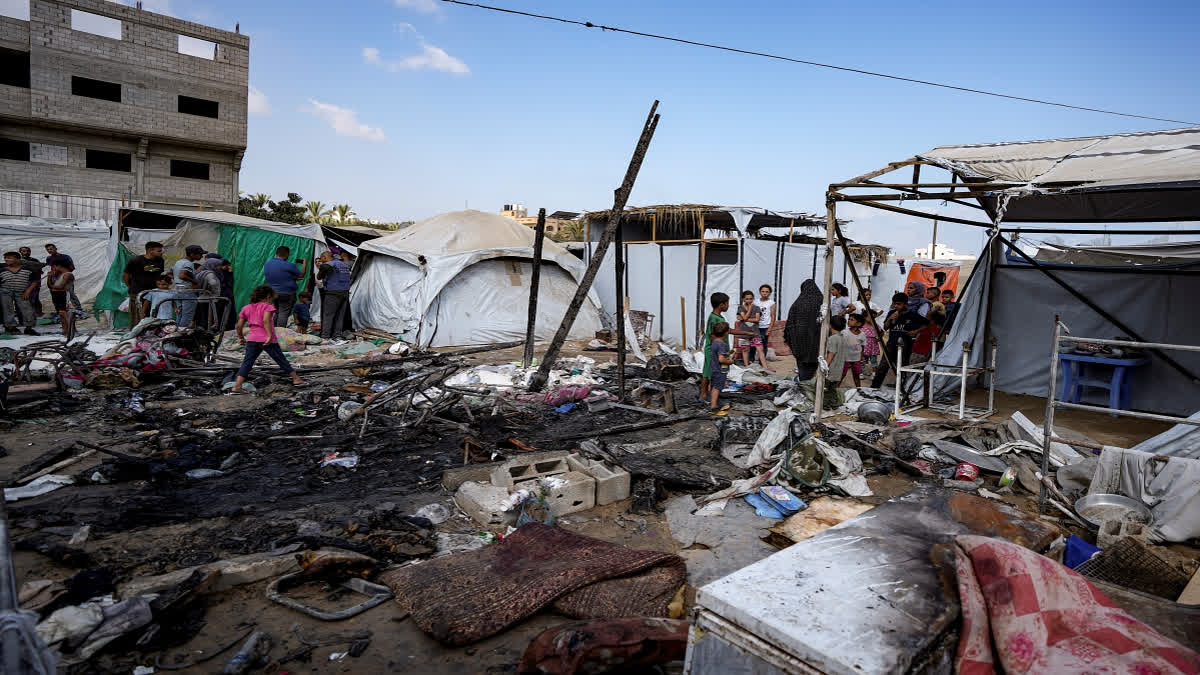Following the Hezbollah rocket strike of 27 July, on a Druze town of Majdal Shams in the Golan Heights killing 12 children, in the last week of July, in Beirut's southern suburbs, Israel targeted a top Hezbollah commander Fouad Shukr who threatened with the counterattacks across Lebanon's southern border in parallel with the Gaza war; and the chairman of Hamas' Political Bureau, Ismail Haniyeh, while attending the inauguration of the Iranian President.
In another serious blow to Iran and its axis of resistance which encompasses militant groups in Palestine, Iraq, Lebanon, Yemen and Syria, Israel has declared that it killed top Hamas military commander Mohammed Deif, the planner of the Al-Aqsa Flood Operation (October 7 attacks) on 13 July airstrike.
Enmity between Israel and Iran
Subsequent to these targeted killings, the 40-year-old enmity between Israel and Iran and its axis of resistance had entered a new phase. At present, how the death of a key leader will impact Hamas? How Iran and other proxy groups are going to trigger the threats of retaliation? How Israel and the United States (US) are heading to respond to the threat in future are agonising the world.
Ever since Haniyeh became Chairman of Hamas’ Political Bureau in 2017, he has been a strategic planner, a key leader in navigating the rising power of Hamas regionally, globally and most significantly he motivated support for Hamas after October 7 by reaching out to Turkey, China and Russia. He also played a considerable role in the negotiations for the release of hostages taken by Hamas.
Now, his death gives a great blow to Hamas in both Gaza and the Middle East. In fact, the killing of Haniyeh is not supposed to upset the ideological or operational capabilities of Hamas but it can create a momentary pause. Hamas' leadership has seen the killing of Ahmed Yassin and Abdel Aziz-al-Rantisi, the founders of the Hamas movement in 2004 but Hamas was not rooted out, instead the group grew even stronger. International geopolitical strategists believe that Hamas will continue to remain as a movement under the leadership of Yanya Sinwar, who had fully transformed Hamas into the 24 battalions of fighters that launched the October 7 attacks on Israel.
Iran prefers to prolong the proxy war
Earlier, Iran does not want to undertake a direct war and prefers to prolong the proxy war with the assistance of the axis of resistance, but the killing of Haniyeh deep in its territory is an embarrassment to Iranian security services and subsequently calls for a strident reply to convince the Iranians and people of the Arab world.
However, in the immediate future, if it should become directly involved, the conflict would be twisting into a regional war. Iran has already surrounded Israel with missiles and drones through its "unity of the arenas" strategy, which involves joint military operations by axis of resistance members against Israel. If Iran decides to synchronise simultaneous bombings of Israel by its proxies be possibly very destructive and bring the US into the battle on the Israeli side the one which Israel wants. Moreover, after the Israel-Hamas war, the economy of Iran is weak due to the decline of Rial against the US dollar. Consequently, it is not in Iran's interest to get complicated by directly engaging in the war, but, its strategy may be instead of the full-scale war, it covets to continue the conflict below the brink of regional war to evade the direct involvement of the US.
Iran and its backed Axis of Resistance including Hamas, Lebanon's Hezbollah, Yemen's Houthis, Kataib Hezbollah, the Islamic Resistance in Iraq, the 47th Popular Mobilization Unit brigade (PMU) of Shi’ites in Iraq and various Shi’ite armed groups in Iraq and Syria may opt for other options like attacks on settlements and military bases in Israel's Otef Aza region by Hamas; U.S. military bases Al-Tanf, Al-Rukban, and Al-Malikiya in eastern Syria near the border with Iraq by the Islamic Resistance in Iraq; Israeli settlements in the Golan Heights by armed groups of Syria.
Kataib Hezbollah could attack Iran
Kataib Hezbollah could also attack Israel in retaliation for its strikes on Beirut on 31 July 2024. Israel’s targeted killings have stimulated the anti-Israel campaign across Muslim-majority countries globally and as well enhanced the recruitment efforts of militant groups. Militant groups may escalate attacks against Israel and American interests anywhere by attacking diplomatic missions, Jewish Diaspora and American nationals.
Israel’s Nili unit (The Eternity of Israel Will Not Lie) has been hunting down to eliminate every individual who played a role in the 7 October attacks. By the assassination of Reza Mousavi, a top Iranian commander in December 2023 and Hamas no.2 Saleh al-Arouri in January 2024, and now Haniyeh, Israel gave a clear message to important persons of Hamas Yahya Sinwar and others that they are not safe anywhere.
In the contemporary retaliation threat, Israeli Air Force chief Tomer Bar warned that Israel will act against anyone planning to harm its citizens and declared Israel’s strong preparedness to carry out their mission with its aerial defence and control personnel put on duty across the country with the best equipment.
White House reiterates assurance to Israel
In the meantime, the White House reiterated its assurance to Israel’s security against all threats from Iran and its proxy groups. While the US has had two navy destroyers, the USS Roosevelt and the USS Bulkeley, with the USS Wasp and the USS New York part of the amphibious ready group in the Gulf of Oman and in the eastern Mediterranean Sea, furthermore US is taking steps to send more warships, additional ballistic missile defence-capable cruisers, destroyers, fighter jets and land-based ballistic missile defence weapons to Middle East to aid Israel defend possible Iranian attack.
India has grave consequences
India has also grave consequences as the Middle East plays a crucial role in India's economy as it supplies just about two-thirds of India's total oil import, and bilateral trade is also prosperous mainly with the United Arab Emirates and other Arab states of the Persian Gulf. The spiking tensions would disrupt transport apparent from Air India's suspension of its flights to and from Israel’s Tel Aviv till August 8. Also, amid escalating tensions in the Middle East, India issued an advisory to Indians to leave Lebanon at the earliest.
The world is worrying about the repercussions of the explosive and unpredictable situation in the Middle East whether the region is en route for a major war which would impact the global economic, military and political consequences. The reactions from Hamas, Hezbollah and in particular Iran, which has suffered a major setback deep inside its territory, will determine whether the conflict will escalate or not.
They have been conducting a comprehensive evaluation for an unrivalled and effective means to retaliate against Israel by means of a full-scale war or go on with the political, psychological and covert combat. If there is any escalation promoted by Iran and its axis of resistance aside, and Israel and the US on the opposite side, the prospect of a regionalised war will shortly become a reality.
Walter Russell Mead an American academic in Wall Street Journal hopes that the strikes in Beirut and Tehran by Israel may restrain Iran and Hezbollah to contemplate their options for retaliation, rather than a war, in lieu of Israel's power.
(Disclaimer: The opinions expressed in this article are those of the writer. The facts and opinions expressed here do not reflect the views of ETV Bharat)



